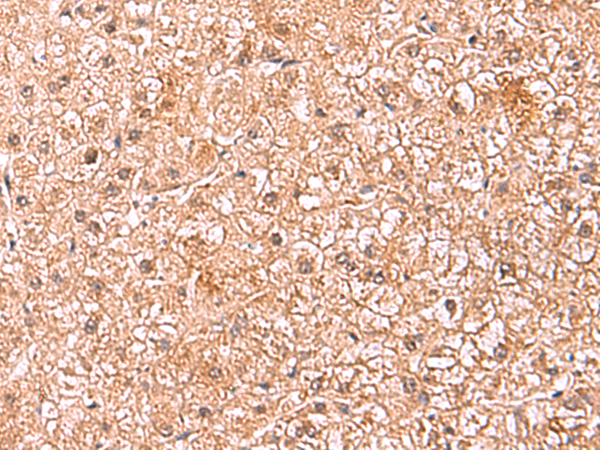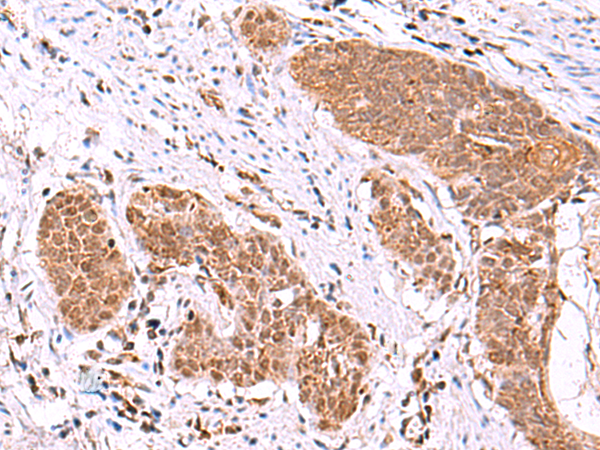

| WB | 咨询技术 | Human,Mouse,Rat |
| IF | 咨询技术 | Human,Mouse,Rat |
| IHC | 1/50-1/300 | Human,Mouse,Rat |
| ICC | 技术咨询 | Human,Mouse,Rat |
| FCM | 咨询技术 | Human,Mouse,Rat |
| Elisa | 1/5000-1/10000 | Human,Mouse,Rat |
| Aliases | bA67K19.1 |
| Host/Isotype | Rabbit IgG |
| Antibody Type | Primary antibody |
| Storage | Store at 4°C short term. Aliquot and store at -20°C long term. Avoid freeze/thaw cycles. |
| Species Reactivity | Human, Mouse |
| Immunogen | Fusion protein of human ASTN2 |
| Formulation | Purified antibody in PBS with 0.05% sodium azide and 50% glycerol. |
+ +
以下是关于ASTN2抗体的3篇代表性文献(信息基于公开研究整理,可能存在简化):
---
1. **文献名称**: *ASTN2 modulates synaptic organization by regulating membrane trafficking of adhesion proteins*
**作者**: Shibata, M., et al.
**摘要**: 本研究通过免疫共沉淀和Western blot技术,揭示了ASTN2蛋白通过与细胞黏附分子(如Neuroligin)相互作用调控突触形成的分子机制。研究使用特异性ASTN2抗体证实其在神经元中的亚细胞定位,并发现其缺失导致小鼠突触可塑性异常。
---
2. **文献名称**: *Rare variants in ASTN2 disrupt signaling pathways in neurodevelopmental disorders*
**作者**: Behesti, H., et al.
**摘要**: 通过全基因组关联分析发现ASTN2罕见变异与自闭症谱系障碍(ASD)相关。研究利用ASTN2抗体进行免疫组化,发现变异导致蛋白在小脑颗粒细胞中的表达异常,进而影响神经元迁移路径,提示ASTN2在神经发育中的关键作用。
---
3. **文献名称**: *Astrotactin-2 (ASTN2) as a biomarker for glioblastoma progression*
**作者**: Cheng, Y., et al.
**摘要**: 该研究首次报道ASTN2在胶质母细胞瘤中高表达,并通过免疫荧光和流式细胞术(使用商业化ASTN2抗体)验证其与肿瘤侵袭性的正相关性。机制研究表明ASTN2通过调控Wnt/β-catenin通路促进癌细胞迁移。
---
**注**:若需具体文献全文或补充DOI信息,建议通过PubMed或Google Scholar使用关键词“ASTN2 antibody”、“ASTN2 function”进一步检索。部分研究可能需结合上下文确认抗体应用场景(如WB、IHC等)。
The ASTN2 antibody is a research tool designed to detect and study astrotactin-2 (ASTN2), a protein encoded by the ASTN2 gene. ASTN2 is a transmembrane glycoprotein predominantly expressed in the central nervous system, where it plays a role in neuronal migration, synaptic adhesion, and neurodevelopment. It interacts with extracellular matrix components and cell-surface receptors to guide neuronal positioning during brain development. Dysregulation of ASTN2 has been implicated in neurodevelopmental and neuropsychiatric disorders, including autism spectrum disorder (ASD), schizophrenia, and intellectual disability, with genetic studies linking ASTN2 mutations or copy-number variations to these conditions.
ASTN2 antibodies are widely used in neuroscience research to investigate protein expression, localization, and function in cellular and animal models. They enable techniques like Western blotting, immunohistochemistry, and immunofluorescence to visualize ASTN2 distribution in brain tissues or cultured neurons. Additionally, these antibodies aid in exploring molecular mechanisms underlying ASTN2-associated pathologies, such as disrupted synaptic plasticity or aberrant neural circuitry. Commercial ASTN2 antibodies are typically raised in hosts like rabbits or mice, targeting specific epitopes within the protein's extracellular or intracellular domains. Validation steps, including knockout controls and peptide blocking, are essential to ensure specificity, given potential homology with related proteins like ASTN1. Research using ASTN2 antibodies continues to clarify its role in brain development and disease pathways.
×